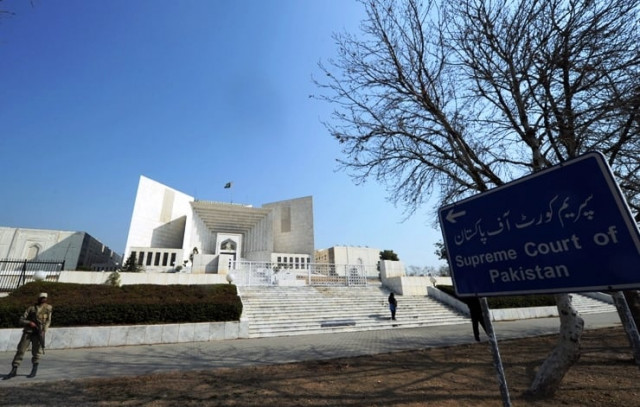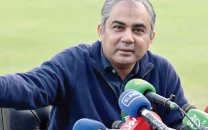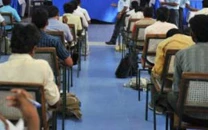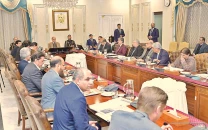NRO implementation case: SC decries ‘unsatisfactory’ NAB report
Orders bureau to submit statements of accused individuals, including prime minister, along with a compliance report.

The delay in verdict of the NRO implementation case continued on Monday as the Supreme Court deferred the case against Prime Minister Yousaf Raza Gilani regarding the government’s failure to implement the apex court’s NRO verdict.
It has been alleged that the prime minister had appointed several NRO beneficiaries to public offices, while he also refused to write a letter to the Swiss authorities against the reopening of graft cases against President Asif Zardari. The hearing has been deferred till May 3.
However, the Supreme Court expressed displeasure over ‘unsatisfactory’ reports presented by the National Accountability (NAB) in the NRO implementation case and ordered the bureau to submit statements of the accused persons, including the prime minister along with a compliance report. The court also directed the NAB to make efforts for the repatriation of former attorney general Malik Qayyum. A seven-member bench headed by Justice Nasirul Mulk heard the case. Mulk said the NAB reports were “utterly unsatisfactory and unfair,” while Justice Asif Khosa, another judge of the bench, said that while the NAB had exonerated one of the accused (the prime minister), who had authorised the appointments, it was not only targeting those who followed his orders. He went on to decry the ‘old-fashioned’ system which only punished ordinary citizens.
Nevertheless, the bench gave the prime minister yet another opportunity to implement its judgment on the National Reconciliation Ordinance (NRO) and deferred the case till May 3.
During the contempt of court proceedings, the prime minister’s counsel, Aitzaz Ahsan, was told by the bench to continue arguing the case as they were not sure what kind of order would be passed. Justice Asif Saeed Khosa told the PM’s lawyer that the judges were not here with a preoccupied mind and they would issue an order after hearing the case.
However, the court deferred the case till May 3, giving yet another chance to the PM to write a letter to the Swiss authorities. Not an individual, whatever his name or office he holds, but only the law shall rule the country, observed the seven-member bench.
During proceedings, the NAB chairman’s counsel Shaiq Usmani submitted three inquiry reports on NRO beneficiaries allegedly appointed by the PM. The first was on Adnan Khawaja, who was appointed Navtec chairman and then OGDCL chairman, allegedly on the PM’s orders, the second inquiry report was on Ahmed Riaz Sheikh, who was appointed as additional DG FIA, while the third was on former attorney general Malik Qayyum.
The court noted that Adnan Khawaja was appointed first as chairman Navtec and later chairman OGDCL on the order of the premier, but no action had been taken against him, while Ahmed Riaz Sheikh was not investigated as an accused and stands exonerated.
Usmani briefed the court about action taken against the persons involved in the appointment of Adnan Khawaja and Ahmed Riaz Sheikh. He informed the court that the prime minister was not aware that Adnan Khawaja was a NAB convict at the time of his appointment as Navtec chairman. Usmani, however, informed the court that they have started investigation against Khalid Ikhlaq, Rang Ali Zia and Ismail Qureshi, who concealed Adnan’s convict status from the PM, while action had been initiated against Ahsan Raja, the then acting secretary ministry of interior, Maqbool Ahmed Malik, Uroog-ul-Hassan and Ismail Qureshi, who were involved in the appointment of Ahmed Riaz Sheikh as additional DG.
The court directed the NAB counsel to furnish a complete record along with the summaries and dates of Adnan Khawaja’s appointments. Usmani went on to add that the NAB had summoned Malik Qayyum several times but there had been no response from Qayyum.
However, Qayyum’s son had informed the NAB that he was in London and recently underwent a kidney transplant, adding that a questionnaire had been sent through the Pakistan High Commission in UK for Malik Qayyum but no reply had been received as of yet.
Earlier, in the contempt of court case against the prime minister, Aitzaz Ahsan dwelled upon Article 10-A of the constitution, saying the present bench could not try the prime minister for contempt as that would be in conflict with the principles of a fair trial. He will continue to argue the case on Tuesday (today).
Published in The Express Tribune, April 17th, 2012.


















COMMENTS
Comments are moderated and generally will be posted if they are on-topic and not abusive.
For more information, please see our Comments FAQ